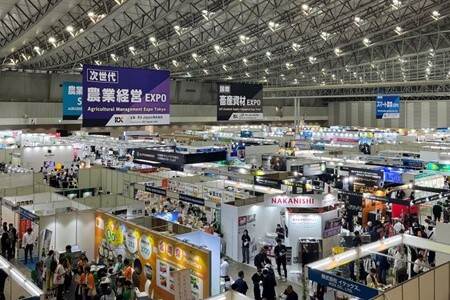Japan is on the verge of a boom in agricultural production, according to Takeshi Sudo, project director at agribusiness consultant Agri Connect. Much like the Japanese economy in the sixties of the last century, Sudo believes the heyday of Japan’s agriculture is yet to come.
Sudo spoke at a seminar at the Farm Design & Development Forum, held at J Agri Week last October, where he laid down the recipe for successful agribusiness development: implementing cross-industry strategies and collaboration between local authorities. Sudo knows what he is talking about, having been formerly responsible for new business development at Fujitsu (2012-2022), in which role he helped establish new greenhouse businesses like Smart Agriculture Iwata (SAC Iwata) and Grand Bouquet Otaki (GBO).
Both are successful cases of collaboration between local authorities and external parties (investors) resulting in appealing business models. SAC Iwata is a 8,5 ha cluster of mid-to-high tech greenhouses, cultivating complementary crops, with shared research and shipping facilities. GBO is a cutting edge orchid cultivation facility invested in innovation in packaging and shipping. Sudo managed both business entities on behalf of Fujitsu before they were sold on to the next investors. SAC Iwata is now part of Daiwa Food & Agriculture, and GBO of Aucnet Group.
Clearly, such development is not yet happening all over Japan. When considering the promotion of new agribusiness in their areas, most local authorities tend to get hung up on the present situation, focusing on current farmers and crops, unable to look beyond the farming perspective. But Sudo is convinced local authorities eventually will sign up for a broader business development perspective in which farming is considered in conjunction with other activities. With over 120 agribusiness projects by local authorities currently in development, Sudo has reason to be optimistic. And he is ready to do his part for more.
At the seminar, Sudo lectured on the need for ‘design thinking’, calling on local officials to approach business development from the perspective of desirable business models and to seek out companies and organizations able to bring about the desired results for collaboration on an equal footing. He also pointed at the need for close collaboration between various levels of local authorities, given the divided responsibilities for budget and planning, as well as collaboration beyond local borders at the level of business operators linking production strengths from various regions.
In the Netherlands, we know all about successful agribusiness projects and clustering, as Sudo is well aware. In his presentation, Sudo referred to Agriport A7 as a good illustration of what is possible if companies’ needs take center stage in local business development. It would be great if our companies and knowledge institutes could offer support to this development in Japan as well, not merely by serving as a model, but by becoming active partners in collaborative projects.
